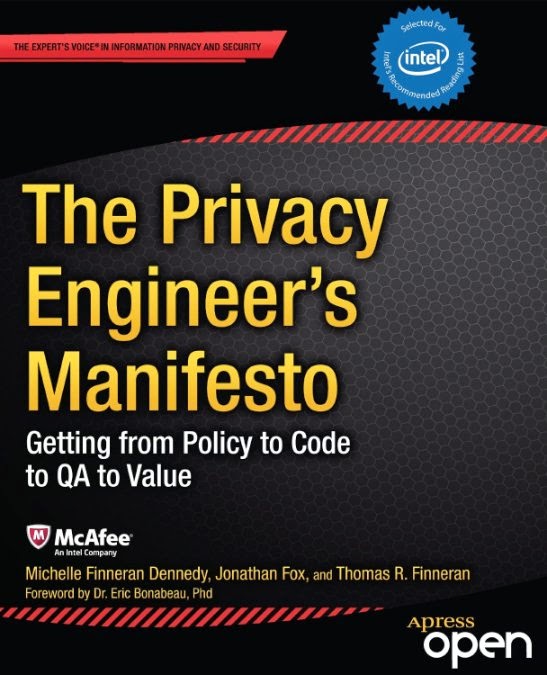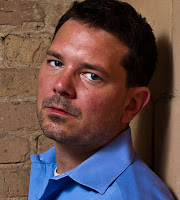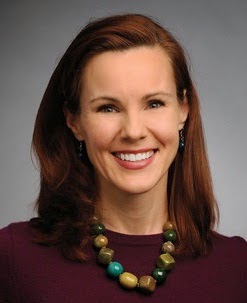The Privacy Engineer's Manifesto
Privacy Engineering: What Researchers Need to Know

'The fantastic advances in the field of electronic communication
constitute a greater danger to the privacy of the individual.'
constitute a greater danger to the privacy of the individual.'
' Earl Warren, 14th Chief
Justice of the U.S. Supreme Court, died 1974
Justice of the U.S. Supreme Court, died 1974
'Privacy is dead, and social media hold the
smoking gun.'
smoking gun.'
' Pete Cashmore, Founder and CEO of Mashable, born 1985
The fellas quoted above
were, I believe, referring to opposing sides of the privacy coin: The former
was talking about government surveillance of the Orwellian sort; the latter'taken
from a 2009 blog post'spoke to people's increasing compulsion to publicize their
personal lives.
were, I believe, referring to opposing sides of the privacy coin: The former
was talking about government surveillance of the Orwellian sort; the latter'taken
from a 2009 blog post'spoke to people's increasing compulsion to publicize their
personal lives.
To distinguish between the
two assumes there is a line that can be crossed, aka 'informed consent.'
two assumes there is a line that can be crossed, aka 'informed consent.'
Privacy advocates have
argued that informed consent is more or less a fallacy because the information
needed to make a fully informed choice is largely inaccessible
argued that informed consent is more or less a fallacy because the information
needed to make a fully informed choice is largely inaccessible
But privacy advocates'including
top security and legal experts'have argued that informed consent is more or
less a fallacy, because the information needed to make a fully informed choice
is largely inaccessible to the
average person.
top security and legal experts'have argued that informed consent is more or
less a fallacy, because the information needed to make a fully informed choice
is largely inaccessible to the
average person.
That's 'inaccessible' in three
broad categories:
broad categories:
1.
Inaccessible by design'for legit* purposes
(national security or law enforcement) and also for ethically questionable purposes
(ex. Facebook's privacy gaffes and antics).
Inaccessible by design'for legit* purposes
(national security or law enforcement) and also for ethically questionable purposes
(ex. Facebook's privacy gaffes and antics).
*Sorry, but I'll not kick the Edward
Snowden beehive in this forum today.
Snowden beehive in this forum today.
2.
Inadvertently inaccessible, but fixable'Ex. privacy
policies that can only be deciphered by lawyers or that will only be read by
very patient, unusually suspicious people with lots of time on their hands.
Inadvertently inaccessible, but fixable'Ex. privacy
policies that can only be deciphered by lawyers or that will only be read by
very patient, unusually suspicious people with lots of time on their hands.
3.
Inadvertently inaccessible, but unavoidable'the
complex tangle of partnerships, affiliations, agreements and policy overlaps,
oversights, contradictions, accidents, etc., that comprise our digital universe
(it is called the Web, after all) make it practically impossible for someone to
be completely informed of all the ways information about them may be or is
being used.
Inadvertently inaccessible, but unavoidable'the
complex tangle of partnerships, affiliations, agreements and policy overlaps,
oversights, contradictions, accidents, etc., that comprise our digital universe
(it is called the Web, after all) make it practically impossible for someone to
be completely informed of all the ways information about them may be or is
being used.
The jury appears to be
out when it comes to the ownership and control of all of those digital data
points we generate
out when it comes to the ownership and control of all of those digital data
points we generate
I'll leave it to the
intelligentsia (not used in the pejorative here) to debate whether or not we're
doomed to life in a digital panopticon, but the jury appears to be indefinitely
out when it comes to the ownership and control of all of those data points we're
generating in the digital realm.
intelligentsia (not used in the pejorative here) to debate whether or not we're
doomed to life in a digital panopticon, but the jury appears to be indefinitely
out when it comes to the ownership and control of all of those data points we're
generating in the digital realm.
This much is clear: The
privacy debate isn't going anywhere; it's just getting started.
privacy debate isn't going anywhere; it's just getting started.
People seem resigned
to the fact that information about them is collected and used for purposes they
aren't aware of and might not consent to if they were
to the fact that information about them is collected and used for purposes they
aren't aware of and might not consent to if they were
For the time being, people
seem generally resigned to and even comfortable with the fact that information
about them is being collected by unknown others and used in all kinds of ways
for all sorts of purposes that we aren't aware of and might not consent to if
we were.
seem generally resigned to and even comfortable with the fact that information
about them is being collected by unknown others and used in all kinds of ways
for all sorts of purposes that we aren't aware of and might not consent to if
we were.
But for how long? It seems a
tenuous peace at best.
tenuous peace at best.
 I've attended sessions at
I've attended sessions attwo of FoCI's sister events within the past six months'Foresight & Trends
and Media Insights & Engagement, respectively'whose speakers warned their
audiences that the sleeping giant is stirring.
All of this
matters to insights jocks more than one might suppose.
matters to insights jocks more than one might suppose.
Consumer researchers work hard to build and
maintain respondents' trust, and I think most would agree that there's no
privacy bugaboo in taking surveys, participating on panels, etc.
maintain respondents' trust, and I think most would agree that there's no
privacy bugaboo in taking surveys, participating on panels, etc.
But even if transparent,
double opt-in instruments are still the primary source of consumer intelligence'debatable'they're
certainly not the only source.
double opt-in instruments are still the primary source of consumer intelligence'debatable'they're
certainly not the only source.
We have Big Data now, pulled
from across the digital universe. The sheer breadth of sources without a doubt increases
the likelihood that we've violated someone's privacy.
from across the digital universe. The sheer breadth of sources without a doubt increases
the likelihood that we've violated someone's privacy.
As consumer insights become
increasingly dependent upon and intertwined with technology, we find ourselves
in a precarious position
increasingly dependent upon and intertwined with technology, we find ourselves
in a precarious position
So as the consumer
intelligence field becomes increasingly dependent upon and intertwined with technology,
we find ourselves in an increasingly precarious position because we cannot be
guaranteed that the data we're collecting and analyzing was captured with
informed consent.
intelligence field becomes increasingly dependent upon and intertwined with technology,
we find ourselves in an increasingly precarious position because we cannot be
guaranteed that the data we're collecting and analyzing was captured with
informed consent.
Moreover, research
professionals cast in the traditional mold aren't the only ones accessing and
using these data. We're not necessarily the gatekeepers and we can't always
know which information from even our own internal databases is being used, how
and by whom.
professionals cast in the traditional mold aren't the only ones accessing and
using these data. We're not necessarily the gatekeepers and we can't always
know which information from even our own internal databases is being used, how
and by whom.
That is the domain of the
chief privacy officer, or in lieu of a CPO, typically a mishmash of IT and
legal folks.
chief privacy officer, or in lieu of a CPO, typically a mishmash of IT and
legal folks.
Enter Michelle Dennedy, VP and Chief Privacy Officer at McAfee,
and co-author of 'The Privacy Engineer's Manifesto: Getting from Policy to Code
to QA to Value.'
and co-author of 'The Privacy Engineer's Manifesto: Getting from Policy to Code
to QA to Value.'
Dennedy is a top authority whose credentials straddle the legal and
technological aspects of data security and privacy.
technological aspects of data security and privacy.
She and co-authors Jonathon
Fox and Thomas Finneran have developed a new model: 'privacy
engineering,' which endeavors to operationalize privacy and embed it in the products and processes companies use, buy, create and
sell.
Fox and Thomas Finneran have developed a new model: 'privacy
engineering,' which endeavors to operationalize privacy and embed it in the products and processes companies use, buy, create and
sell.
'Privacy engineering is a way to build respect for information about
people back into our infrastructure and to think about data from the consumer
perspective'
people back into our infrastructure and to think about data from the consumer
perspective'
'Privacy
engineering is a way to build respect for information about people back into
our infrastructure and to think about data from the consumer perspective,'
Dennedy told The Research Insighter.
engineering is a way to build respect for information about people back into
our infrastructure and to think about data from the consumer perspective,'
Dennedy told The Research Insighter.
This
is particularly important to the Future of Consumer Intelligence audience
because companies are increasingly looking outside the
research function to data scientists to manage Big Data.
is particularly important to the Future of Consumer Intelligence audience
because companies are increasingly looking outside the
research function to data scientists to manage Big Data.
 The
Theapproach outlined in 'The Privacy Engineer's Manifesto' appears to offer a blueprint consumer researchers can
use to insinuate themselves in the fundamental discussions that shape not only
privacy policy and practice, but the manner and extent to which companies
harness Big Data moving forward.
(Full disclosure: I have not yet read the book, but I've researched it thoroughly and rest assured you don't need to be an IT specialist to understand it.)
'At
best, most companies probably leverage maybe 1-2% of the true import of data
through analytics that count,' noted Dennedy.
best, most companies probably leverage maybe 1-2% of the true import of data
through analytics that count,' noted Dennedy.
'A lot of Big Data analytics are wrong because they fail to address the
true business problem, a human problem.'
true business problem, a human problem.'
'I
think a lot of these Big Data analytics are wrong or bad,' she added, 'because
they fail to address the true business problem, and by that I mean a human
problem.'
think a lot of these Big Data analytics are wrong or bad,' she added, 'because
they fail to address the true business problem, and by that I mean a human
problem.'
'Researchers tend to
understand the business case and how data should be leveraged,' she observed.
understand the business case and how data should be leveraged,' she observed.
According to Dennedy, it's
time for researchers to step up and reach out to their counterparts in
functions they may not normally work with, even if it means taking on projects
outside their current purview.
time for researchers to step up and reach out to their counterparts in
functions they may not normally work with, even if it means taking on projects
outside their current purview.
'Consumer
and marketing researchers become quintessentially important when they carry
insights across the aisle,' Dennedy said.
and marketing researchers become quintessentially important when they carry
insights across the aisle,' Dennedy said.
'Make
sure those customer insights and pain points are part of the equation from the
start.'
sure those customer insights and pain points are part of the equation from the
start.'
In
this podcast for The Research Insighter'the official interview series of the
Future of Consumer Intelligence (FoCI) conference'Dennedy discusses:
this podcast for The Research Insighter'the official interview series of the
Future of Consumer Intelligence (FoCI) conference'Dennedy discusses:
' 'Privacy engineering''what it is and why it
matters
matters
' The problem with Big Data
' Applications and implications for large and small
companies, alike
companies, alike
' What researchers can do today to get involved, and
more!
more!
Editor's note: Michelle Dennedy will present 'The
Privacy Manifesto' at The Future of Consumer Intelligence Conference taking place May 19-21 in Universal City,
California.
Privacy Manifesto' at The Future of Consumer Intelligence Conference taking place May 19-21 in Universal City,
California.
SAVE 15% on your registration to attend The Future of
Consumer Intelligence when you use code FOCI14BLOG.
Consumer Intelligence when you use code FOCI14BLOG.
Register here today!
For more information, please visit www.futureofconsumerintel.com

ABOUT THE AUTHOR / INTERVIEWER
Marc Dresner is IIR USA's sr. editor and special communication project lead. He is the former executive editor of Research Business Report, a confidential newsletter for the marketing research and consumer insights industry. He may be reached at mdresner@iirusa.com. Follow him @mdrezz.

